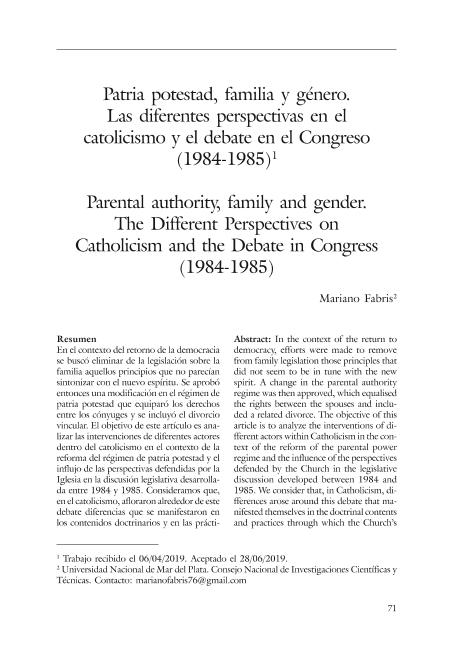Mostrar el registro sencillo del ítem
dc.contributor.author
Fabris, Mariano

dc.date.available
2022-11-18T15:20:39Z
dc.date.issued
2019-07
dc.identifier.citation
Fabris, Mariano; Patria potestad, familia y género: las diferentes perspectivas en el catolicismo y el debate en el Congreso (1984-1985); Universidad Nacional de Córdoba; Estudios Digital; 42; 7-2019; 71-90
dc.identifier.issn
1852-1568
dc.identifier.uri
http://hdl.handle.net/11336/178342
dc.description.abstract
En el contexto del retorno de la democracia se buscó eliminar de la legislación sobre la familia aquellos principios que no parecían sintonizar con el nuevo espíritu. Se aprobó entonces una modificación en el régimen de patria potestad que equiparó los derechos entre los cónyuges y se incluyó el divorcio vincular. El objetivo de este artículo es analizar las intervenciones de diferentes actores dentro del catolicismo en el contexto de la reforma del régimen de patria potestad y el influjo de las perspectivas defendidas por la Iglesia en la discusión legislativa desarrollada entre 1984 y 1985. Consideramos que, en el catolicismo, afloraron alrededor de este debate diferencias que se manifestaron en los contenidos doctrinarios y en las prácticas a través de los cuales se buscó definir y defender las posiciones de la Iglesia en la escena pública. Asimismo, entendemos que, en el debate legislativo, junto a un discurso que buscó redefinir los marcos de acción del poder eclesiástico, se pusieron de manifiesto diferentes formas de integrar principios y reclamos provenientes de la Iglesia. En este sentido, se expresó la perdurabilidad de los vasos comunicantes entre poder político y poder eclesiástico y la centralidad del catolicismo en la cultura política argentina.
dc.description.abstract
In the context of the return to democracy, efforts were made to remove from family legislation those principles that did not seem to be in tune with the new spirit. A change in the parental authority regime was then approved, which equalised the rights between the spouses and included a related divorce. The objective of this article is to analyze the interventions of different actors within Catholicism in the context of the reform of the parental power regime and the influence of the perspectives defended by the Church in the legislative discussion developed between 1984 and 1985. We consider that, in Catholicism, differences arose around this debate that manifested themselves in the doctrinal contents and practices through which the Church’s positions in the public arena were defined and defended. Likewise, we understand that in the legislative debate, together with a discourse that sought to redefine the frameworks of action of ecclesiastical power, different ways of integrating principles and claims coming from the Church were shown. In this sense, the durability of the communicating vessels between political power and ecclesiastical power and the centrality of Catholicism in Argentine political culture was expressed.
dc.format
application/pdf
dc.language.iso
spa
dc.publisher
Universidad Nacional de Córdoba
dc.rights
info:eu-repo/semantics/openAccess
dc.rights.uri
https://creativecommons.org/licenses/by-nc-sa/2.5/ar/
dc.subject
PATRIA POTESTAD
dc.subject
GÉNERO
dc.subject
IGLESIA
dc.subject
CATOLICISMO
dc.subject.classification
Historia

dc.subject.classification
Historia y Arqueología

dc.subject.classification
HUMANIDADES

dc.title
Patria potestad, familia y género: las diferentes perspectivas en el catolicismo y el debate en el Congreso (1984-1985)
dc.title
Parental authority, family and gender: The Different Perspectives on Catholicism and the Debate in Congress (1984-1985)
dc.type
info:eu-repo/semantics/article
dc.type
info:ar-repo/semantics/artículo
dc.type
info:eu-repo/semantics/publishedVersion
dc.date.updated
2022-11-17T17:33:52Z
dc.journal.number
42
dc.journal.pagination
71-90
dc.journal.pais
Argentina

dc.journal.ciudad
Córdoba
dc.description.fil
Fil: Fabris, Mariano. Consejo Nacional de Investigaciones Científicas y Técnicas. Centro Científico Tecnológico Conicet - Mar del Plata; Argentina. Universidad Nacional de Mar del Plata. Facultad de Humanidades. Departamento de Historia. Centro de Estudios Históricos; Argentina
dc.journal.title
Estudios Digital
dc.relation.alternativeid
info:eu-repo/semantics/altIdentifier/url/https://revistas.unc.edu.ar/index.php/restudios/article/view/25131
dc.relation.alternativeid
info:eu-repo/semantics/altIdentifier/doi/https://doi.org/10.31050/re.vi42.25131
Archivos asociados
